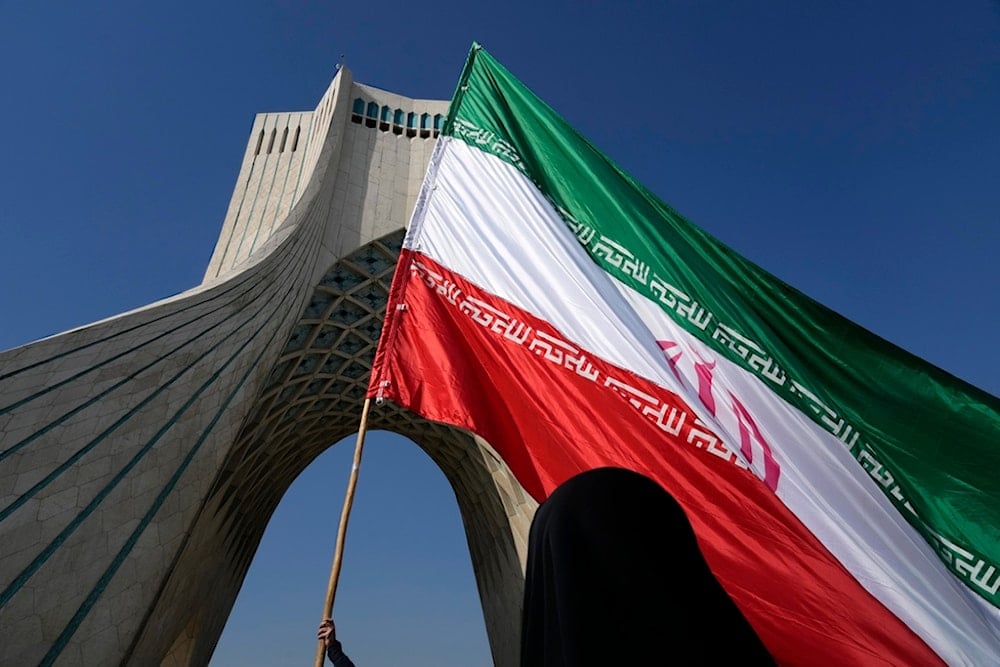Iran denies need for Egyptian mediation in IAEA talks
Iran has rejected claims of Egyptian mediation with the IAEA, asserting direct communication with the agency as it conditions any renewed cooperation on security guarantees following recent Israeli and US strikes.
-

A huge Iranian flag is carried under the Azadi (Freedom) monument tower during the annual rally commemorating Iran's 1979 Islamic Revolution in Tehran, Iran, Sunday, Feb. 11, 2024 (AP)
Iran has dismissed reports suggesting that Egypt is mediating between Tehran and the International Atomic Energy Agency (IAEA), stressing that it communicates with the UN nuclear watchdog directly.
"Reports about Egypt's mediation between Iran and the IAEA are false. Iran does not need an intermediary to resolve its disagreements with the agency, as direct contacts are maintained between Tehran and the IAEA," an Iranian source told the Mehr news agency on Thursday. The statement came a day after Egyptian Foreign Minister Badr Abdelatty told RIA Novosti that Cairo sought to help advance Iran–IAEA cooperation and revive negotiations between Tehran and Washington.
According to an August 6 announcement from Egypt's Foreign Ministry, Abdelatty had recently held separate phone calls with Iranian Foreign Minister Abbas Araghchi and IAEA Director General Rafael Grossi as part of Cairo's wider initiative to foster regional stability, reduce tensions, and push for a diplomatic resolution to the nuclear file. Abdelatty stressed the importance of diplomatic solutions and reactivating IAEA cooperation as a basis for rebuilding trust and regional security.
Nuclear Standoff
The denial comes amid ongoing discussions between Iranian officials and the IAEA. Earlier this week, Iranian Deputy Foreign Minister for International Affairs Kazem Gharibabadi met with IAEA Deputy Director General Massimo Aparo, with both sides agreeing to continue consultations on nuclear matters. IAEA Director General Rafael Grossi stated in early August that Tehran was prepared to resume technical talks but insisted on the immediate return of inspectors to Iranian nuclear facilities.
Tehran, however, has made clear that future cooperation depends on guarantees for the safety of its nuclear sites and scientists. On July 2, President Masoud Pezeshkian issued a decree suspending cooperation with the IAEA, a move Foreign Minister Abbas Araghchi said was informed by the "new reality" created by recent attacks on Iranian nuclear infrastructure and by parliamentary legislation. Araghchi stressed that while some engagement channels remain open, Iran will not allow inspections under current conditions.
Read more: E3 warns may reimpose sanctions on Iran over stalled nuclear talks
The 12-day confrontation began on June 13, when "Israel" carried out a wave of aggressive strikes against Iran, hitting nuclear facilities, senior military figures, scientists, and air bases under the pretext of unfounded accusations about a secret weapons program. On June 22, the United States joined the assault with its own strikes on Iranian nuclear sites, prompting Iran to exercise its right to self-defense by targeting the US Al Udeid air base in Qatar. The escalation concluded on June 23, when US President Donald Trump announced that Iran and "Israel" had agreed to a ceasefire.

 3 Min Read
3 Min Read










